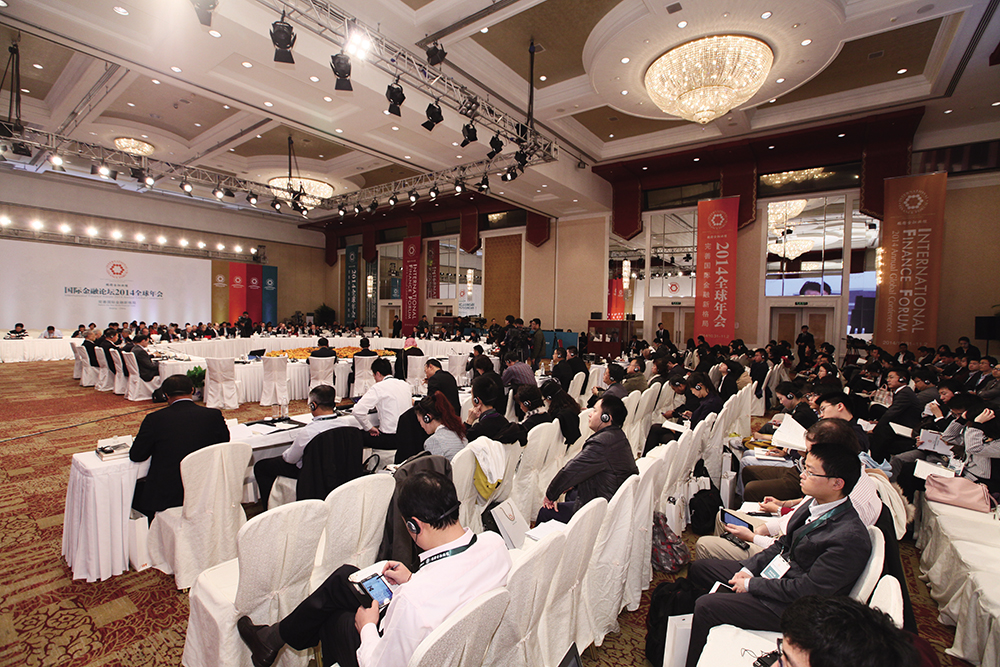IFF 5th Leadership Dialogue:
Global Debt-Risks, Challenges and Opportunities
AUTHOR:IFF
FROM:IFF
TIME:2014-11-03

The 5th Leadership Dialogue in 2014 of International Finance Forum (IFF) was held in Beijing on October 31, Mr. Jamie Caruana, Member of IFF Advisory Committee and General Manager of the Bank for International Settlements (BIS), was invited as the Keynote speaker on Dialogue, making a speech on "Global Debt Risk: Challenges and Opportunities". As one part of the IFF 2014 Annual Global Conference, this dialogue was hosted by Mr. Jin Liqun,Executive Vice President of IFF and Secretary-General of Multilateral Interim Secretariat for Establishing Asian Infrastructure Investment Bank (AIIB). Multiple leading experts from government, academic and business spheres attended the dialogue, including Yukio Hatoyama, Chairman of IFF International Advisory Committee and Former Prime Minister of Japan; Guillermo Ortiz, IFF Board Member and Former Chairman of the Board of BIS and Former Governor of the Banco de Mexico; Kim Jun II, Deputy Governor and Chief Economist of Bank of Korea (BOK); Nicholas Hope, Member of IFF Academic Committee and Director of International Development Center of Stanford University; Xiao Geng, IFF Academic Committee Executive Member and Honorary Professor of University of Hong Kong, etc. Following the keynote dialogue, an extensive and constructive discussion was conducted around the status quo, long-term trend and inherent dynamics of global debt.
Agenda
Global Debts-Risks, Challenges and Opportunities
Bank for International Settlements (BIS) has warned that the present global economy could be influenced by financial crisis as easily as in 2007, which has led to higher risks of more debt and involved the emerging markets. Mr. Jamie Caruana, Member of IFF Advisory Committee and General Manager of Bank for International Settlements, said that investors ignore the risks of tightened monetary policy while hunting greedily for profits. "The perceived range of the market's potential outcome appears to be narrow. Investors believe that monetary policy will remain easy in a long time and they can seek more assurance from central banks in countries. " Caruana thought that in many aspects the international financial system has become more vulnerable before Lehman hit. Worse still, private credits were flourishing in China, Brazil, Turkey and other emerging economies, partly attributed to the spillover effect of the easing policies adopted in some western countries. The long-term monetary stimulus in the US, Europe and Japan caused the liquidity overflow, affecting the rest parts of the world. The rising Asian powers could no longer act as the firewall because they had possibly become the source of the risks.
Keynote Speeches

Though we have not come to a conclusion on the answer to how much debt we have indeed, at least we can say for sure that we cannot relax too much with regard to the market unrest recent years. The years after 2007 crisis witnessed the continuous accumulation of global debt, which has reached an alarming proportion by now. Then the total amount of post-crisis debt, as a result of family, business and government add-up, has reached a daunting point as high as 40%. That's the reason why I always say that we should concern about the critical point, beyond which can we never bear the "weight" of debt.
Developed countries, where debts are mostly carried by governments, are not the only ones that need to pay high attention to debt problems. It is observed that many other countries have witnessed the ratio of debt to GDP surpassed 20-30%. Corporate debts may take a higher proportion in emerging economies. The pressure faced by countries may vary according to their own conditions. For example, household debt remains relatively high in the US, while countries like Britain and Spain might be more vulnerable to the impact of financial crisis turbulence.
……
We don't need any more loan/leverage-encouraging mechanisms. Instead, we need to end the low interest rate as soon as possible. In the long run, low interest rate results in more leverage; so it's necessary for us to reconsider our policy framework to enable a policy package to work.
Viewpoints

It is effective to invest public funds to tackle the issues of growth and debt, but Japanese government invest very limited amount of public funds every year, which results in the unwillingness of banks to lend money to firms. Credit reluctance has been hindering the economic growth for more than 10 years. Till now, Japanese enterprises remain very torpid in growth. Moreover, the capital market in Japan is excessively flooded with high-risk products, outnumbering the normal market of labor force. This results in market failure, and many countries are undergoing this. Consequently, the question that we do have to answer is in what direction our future effective regulation and governance should march.

A lot of researches we have done indicate that debt of certain level will impose impacts on other sectors. This means debt does not always facilitate growth, but impede growth from time to time. Therefore, regulatory authorities should view capital and interest rates with skepticism or caution and take debt as the highest risk in analysis. If the risks are then too high, we need to treat them as potential system risks.

Mr. Caruana just put forward a point: how much (debt) is too much? This is a good question. Before the crisis, IMF failed in warning us about the serious imbalance. The interpretation at the time was the financial markets have been going deepened. Put in another way, we have more debts. Back then, IMF worked under the theory that the market is the cleverest and most capable of allocating resources. Financial innovation is good, as it helps to allocate resources in the most efficient way.
However, is fiscal expansion really necessary after the crisis? Both monetary and fiscal policies should make economic and practical sense when government applied them. And these policies usually bring about unprecedented new problems, say, negative interest rate nowadays.

The recent financial crisis has cost us more than before, which leads us to question ourselves on whether fundamental improvement in productivity is needed. To resolve the crisis, measures should be taken to improve productivity fundamentally.

Provided Japan expects a faster economic growth, the reform we need most is to open the market, and isolate it from the control of consortium. As far as I known, most Japanese companies have awareness of how to improve productivity, whereas they are very worried about the resistance caused by reform, afraid of being taken over when the market becomes over open.

Thus, we must strengthen the public communication in the future. We need to inform the public about the positive effects of painful reform we go through, so that everyone is willing to accept competition, open up and reform the labor market.

I'm from Thailand. We mentioned the question of "how much on earth the aggregate should be" frequently in our conversation. However, we need to focus on the source of debt. Both United States and China has a huge stock of debt, two or three times of GDP. But China's debt price higher, it is particularly true when China's interest rate of debt reach 7% or even 8%. For other advanced economies like the US, it is only about 3%. When we talk about debt or high stock of debt, we have to examine its quality as well as the dynamics determining the debt price.

China's debts amount to 250% of its GDP. Corporate debt, a result of aggressive leveraging in the crisis, accounts for a substantial part of the total. However, I don't see this as a serious problem for China, an emerging economy. With continuous efforts on improving her financial system and enhancing the capital market and corporate bonds market, the Chinese firms is supposed to advance in a sustainable way. Therefore, China should take different policy measures to solve debt issues, which differ much from the advanced economies.